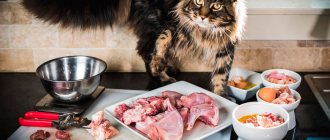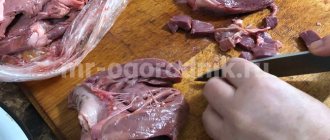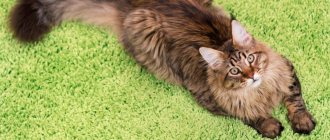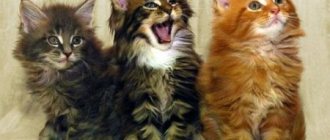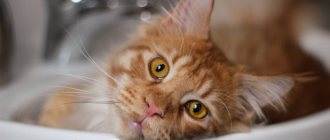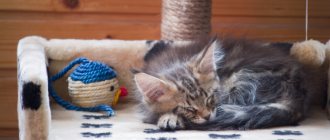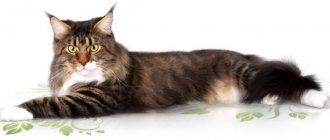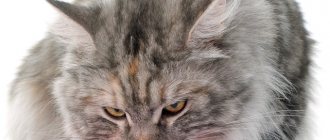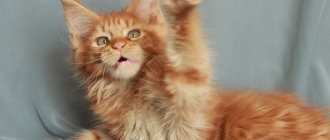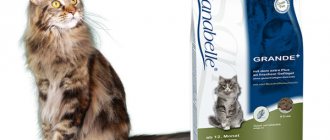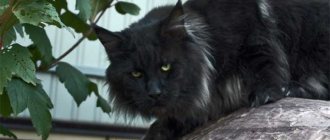What to feed?
I would like to immediately warn Maine Coon owners that this article discusses the general standards for your amazing and unique creatures.
But each cat may have its own individual characteristics related to health, taste preferences, and some rare allergies. Therefore, when creating a menu for your pet every day, do not be lazy to consult with a veterinarian about the acceptable list of products. The main ingredient that should always be in your cat's bowl is meat. Make sure it is fresh at the time of purchase. When you return from the market, do not rush to immediately put it into use. Freeze your purchase for five days, and only after that you can, after scalding it with boiling water, serve it raw. Freezing was required to kill parasites and infection. The following varieties are suitable for us:
- beef,
- rabbit,
- turkey,
- chicken,
- organ meats such as heart, liver or kidneys.
Cereals are also necessary for proper development. An adult does not necessarily need to cook cereals in broth; you can simply cook the porridge in water. You can use any cereal except rolled oats; it can harm the carbohydrate balance. Naturally, do not add any spices, salt, or sugar!
Fermented milk products are required in the daily consumption of your giants. The breed often suffers from stomach upsets, so they need bifidobacteria. Sour cream, kefir, yogurt (regular without additives) are suitable. Cream only in extremely limited quantities.
Vegetables are essential for your pets. You can add them to porridge boiled or give them raw. Pumpkin, cauliflower, carrots, tomatoes and cucumbers are preferred. Sawing or chicken eggs. The following are strictly prohibited:
- pork due to its fat content,
- river fish (sea fish is possible, but at least once a week),
- potatoes (starch is poorly absorbed),
- any sweets,
- any sausages,
- legumes,
- chicken bones.
Adults
Adult cats need to be fed twice a day - morning and evening. In some cases, you can keep the food bowl always full so that your coon can eat when he wants. This is only permissible if the diet is based on ready-made food and the pet does not have a tendency to overeat.
Natural nutrition
The daily diet of Maine Coons with natural feeding should include:
- meat – raw, pre-frozen or scalded veal or beef, boiled chicken, boiled beef and chicken offal;
- fish - only sea or ocean fish and no more than 2 times a week, because it contains salts, which provokes the formation of kidney stones;
- cereals – buckwheat, rice, oatmeal;
- eggs (yolks) – 2 times a week, boiled, preferably quail, but chicken are also acceptable;
- vegetables - boiled or raw carrots, pumpkin, zucchini, cauliflower;
- vegetable fats – have a beneficial effect on the heart, blood vessels and bones;
- dairy products;
- greens - wheat, oats, barley specially sprouted for the cat.
Dairy products include small amounts of butter, low-fat cream, cheese and natural yogurt.
Drinking milk in its pure form is prohibited as it leads to indigestion.
Many owners cook a special mixture for their pets, called “kunya porridge”.
It consists of 80% meat and offal (beef, chicken breasts, turkey, rabbit, heart, chicken liver, necks, heads, stomachs, backs, turkey stomachs, beef tripe, lung), as well as vegetables, vegetable oil and dairy products .
One of the recipes for “marten porridge”:
- 1 kg chicken breasts;
- 1 kg pork or chicken heart;
- chicken liver;
- vegetables;
- olive oil.
- add chicken necks, kelp and cottage cheese before serving.
A natural diet involves additional consumption of Maine Coon vitamin and mineral complexes. These can be multivitamins (Cat VitaminTabs, Beaphar, Polidex) or a complex aimed at maintaining the health of the musculoskeletal system (Cat Mineral Tabs, Velox Gelenk Energie).
Stern
Feeding Maine Coons with industrial food allows cat owners to save time on preparing food for their pets and avoid the need to study information about creating a balanced diet. In addition, such food has a long shelf life, it is convenient to take it with you when traveling, and the daily feeding rate is indicated on the package.
Ready-made food comes in several classes:
- economy;
- premium;
- super - premium;
- holistic.
The division into classes is associated with the different quality of ingredients used in the manufacture of the product.
Cheap food contains grains, low-quality by-products and meat, as well as artificial colors and flavor enhancers, which negatively affects the health of coons.
For representatives of this breed, food of at least premium class is suitable.
And better - super-premium or holistic, containing up to 70% natural meat. Pedigree food lines are available from manufacturers such as Hills, Iams, Royal Canin, Mars, Ralston Purina, Nutro, Diamond Pet Foods, Midwestern Pet Food and Eagle Products.
Wet
Wet food, represented mainly by pates and jellies, contains up to 80% water.
Otherwise, they do not have significant differences from dry food and are also divided into classes and presented in different price categories, which is due to the quality of the products included in their composition.
A coon's diet should not consist of 100% wet food.
It would be more correct to combine them with dry ones in a ratio of 1: 4, while purchasing products from the same manufacturer or at least from the same class.
Dietary
There are several facts about dietary nutrition that every Maine Coon owner needs to know:
food for several days after overeating should be tender and not rich; as first aid for poisoning, you need to give the cat activated charcoal; if the cat refuses food, you should offer him light fish soup - this is the food that coons do not refuse; when allergy symptoms appear, it is important to understand which product causes such a reaction and exclude it from the menu; For gastritis, cats benefit from oatmeal porridge; Most often, kittens and older coons experience the need for dietary nutrition.
Morning (breakfast)
Beef, turkey, beef heart - raw, finely chopped or rolled on a coarse grater, frozen in the refrigerator for at least three days or chicken (boiled breast), I give all other “spare parts” of the chicken raw (stomachs, necks, hearts, liver ...) canned meat for children (don’t buy a lot at once, try one jar at a time, your little one will like it), I use Dr. Klauder canned food. Now I am very pleased with our domestic canned food Best Dinner, I recommend it. Both kittens and adult Maine Coons.
Dry food and plenty of water are freely available throughout the day. It is advisable to purchase a bowl of water of one and a half to two liters, no less, since these comrades love to splash around in it and put toys in it. Change the water EVERY day!! If you see that paws have been washed in it, change it! If you have washed toys, change it! If you wash a piece of meat, change it! Place a bowl of water away from dry food - the food may get wet.
Raising a Maine Coon
The Maine Coon breed is characterized by high intelligence, as well as a very good memory, which greatly simplifies the process of education or training. Such a pet from an early age quickly understands what can be done and what cannot be done. Among other things, Maine Coons perfectly sense the mood of their owner, so the pet is not able to bother him and react correctly to training.
Maine Coon kittens are extremely active, love to play and run, so the animal needs to be ensured complete safety. For this purpose, in the first weeks of life, you can use special playpens or protective prefabricated fencing sections
It is also important to remember that modern Maine Coons have excellent hunting instincts, and such a pet quickly becomes an indispensable catcher of mice and rats. It is for this reason that experts recommend minimizing the Maine Coon’s interaction with pets such as birds, fish and small rodents.
The owner of the nursery or private breeder most often socializes the kitten even before sale, accustoming it to the use of a litter tray and scratching post, as well as the company of people. A popular and incredibly intelligent breed, it is not prone to obstinacy, aggressive behavior or vindictiveness, therefore it is enthusiastic about the process of education based on rewards and verbal prohibitions.
Feeding the Maine Coon with natural food
Feeding a Manx cat natural food does not mean treating him to everything that you yourself eat. Such homemade food will not benefit your pet, quite the contrary.
When preparing a diet, it is very important to find out in advance what Maine Coons can eat and what is not recommended.
| Meat dishes | Maine Coons are allowed to eat boiled chicken, chicken neck and head, as well as frozen chicken or beef offal. But it is not recommended to give pork and duck, in any form - they are difficult to digest and put a strain on the liver. All kinds of “human” canned food, stewed meat, smoked foods and bones are also prohibited. Sometimes you can pamper your cat with boiled liver. |
| Dairy products | Milk is good for small Maine Coons. As animals grow older, their food systems have difficulty digesting milk, causing them to have problems with bowel movements. Therefore, it is not advisable to give milk to an adult cat. You can diversify your diet with kefir, unsweetened bio-yogurt or non-sour cottage cheese, but provided that they do not contain any additives. |
| Fish and all kinds of seafood | Fish, especially capelin, is prohibited for Maine Coons both raw and boiled - it provokes the appearance of worms, and in different organs of the animal. In small quantities, you can pamper your pet with boiled squid or shrimp, cooked at home, without salts and spices. |
| Eggs | It is not recommended to give egg whites of chicken eggs to Maine Coons, but the yolks are good for the health of pets and also have a positive effect on the beauty of their coat. A couple of times a week you can feed your domestic giant quail eggs. |
| Vegetables and fruits | Vegetables and fruits that contain small amounts of starch are excellent for periodic feeding of the Maine Coon. They are added in ground form to other permitted foods. |
Sometimes you can feed the Maine Coon porridge - rice, oatmeal or buckwheat. But porridge is not suitable as the main food, since this breed of cat is quite large and needs healthy food. Fans of the breed have adapted to preparing special kunin porridge, which includes all the necessary ingredients for the health of the pet.
Correctly calculating nutrients in natural nutrition is quite difficult. In addition, special vitamins and microelements must be added to the products.
Vitamins and mineral supplements for Maine Coons are produced by such manufacturers as CANINA, BEAPHAR.
Recommended vitamins for Maine Coons
- Vitamins and mineral supplements: “Top 10” from Canina.
- For strong bones and joints: Kangidrox (GAG Forte) from Canina, as well as “CALCIDEE” (calcium, phosphorus) from 8in1.
- Vitamins for the coat: “BREWERS” from Canina.
It is very important to seal the vitamins tightly and keep them out of reach of the animal.
Meat - meat
Although they claim on many websites that “beef is the healthiest variety,” I would not say so. Well, cats don’t herd cows in nature... not at all. Perhaps wild large felines can cope with such a large animal, but ordinary cats feed on smaller representatives of the “meat component”. In the diet of wild cats: mice, rabbits, snakes, frogs, birds, birds, birds, grass for cleaning the stomach, possibly other small rams and lambs. Therefore, all components of birds (chickens, ducks, quails, turkeys), rabbits are the main thing! Fish, squid, shrimp, as a replacement for reptiles, but strictly boiled and without bones. Remember: fish is suitable for feeding Maine Coons only when boiled. I would recommend any of the types of salmon and cod. Maine Coons love squid in any form. It is not recommended to give fish to castrated cats. You can also give pork. Sometimes. A brand of super premium food like Bozita constantly adds it to its food. I’ll say right away - the pork is strictly boiled and lean. Never give it raw. Lamb and beef are beneficial in terms of taurine. This is beneficial for all red meat and beef, pork or lamb heart. We also remember that chicken meat often causes allergies, so keep an eye on it.
By-products are a source of useful substances. All. Beef tripe. It is useful because it improves digestion and replenishes energy reserves. I’ll say right away that I haven’t tried it. Firstly, I couldn’t find it in stores, and secondly, after smelling it at the market, I didn’t dare try it. Kidneys are very rich in vitamin A. They are given twice a week.
I love day old chicks. They contain all the components: from fluff to cartilage. But no taurine. Therefore, in addition to chickens, the nursery will always add red meat.
Chicken heads are very useful, just remove the beak and sharp bones. Cupid paws - remove claws. Chicken wings - cut along the cartilage and give to the cat, she will diligently eat the meat and leave the bone intact, chicken necks - if you give them whole, beat them off. They contain round cartilage - it can get stuck in the throat.
It is better to give all meat and its parts in finely chopped pieces and raw. At the same time, look at your Maine Coon, raw meat may not be suitable for someone - everyone’s stomachs are different, and only your attention to the animal will help you properly establish its nutrition.
Natural nutrition
Cats are carnivores, so 80% of their daily diet should consist of meat products containing proteins, as well as vitamins and minerals necessary for the smooth functioning of the animal’s body. Natural food is best suited for the Maine Coon breed and should contain:
- Various types of lean meat. The raw product should be frozen in advance so as not to harm the cat’s health. Before serving, you need to grind it in a blender or cut it into small pieces.
- Offal. Give crushed, raw, no more than once a week.
- Sea fish with a minimum amount of bones to avoid injury to the digestive tract. Red varieties of fish, introduced into the diet 1-2 times a week, will help saturate your pet’s body with fatty acids.
- Porridge. Sprouted wheat, oats or barley are best suited for the Maine Coon, since these grains contain the maximum amount of vitamins.
- Eggs. Preference is given to quail eggs, but chicken eggs are also allowed. Veterinarians recommend mixing a raw egg with a small amount of milk and feeding the cat this cocktail 2 times a week.
- Milk, cottage cheese, kefir, natural yogurt without additives. It is better to choose products with a fat content of 5–9%. It is recommended to avoid fermented milk products with a long shelf life: the preservatives included in the composition have a detrimental effect on the general health of your furry pet. It is recommended to gradually eliminate milk from the diet after the kitten reaches six months.
- Fresh and boiled vegetables. Carrots, zucchini, cabbage, cauliflower, pumpkin and cucumbers go well with meat and cereals.
- Greenery. Activates the digestion process and cleanses the stomach of toxic substances.
The Maine Coon must be fed vegetables and dairy products in small portions daily, as they contain fiber and probiotics, which have a positive effect on the pet’s digestion process.
How to switch to natural
If the owners of a Maine Coon, after feeding it with ready-made food, decide to switch the pet to a natural diet, it is important to do this gradually: sudden changes can cause stress and loss of appetite in the pet. Experts recommend replacing 1 meal with your cat every 2-3 days.
The main requirement is that the animal must receive proteins, fats and carbohydrates in quantities necessary for the normal functioning of the entire body.
Experts recommend replacing 1 meal with your cat every 2-3 days. The main requirement is that the animal must receive proteins, fats and carbohydrates in quantities necessary for the normal functioning of the entire body.
Initially, it is recommended to offer the cat meat: if the animal eats it and there are no problems with stool, after a few days the next natural ingredient is introduced.
Dinner (evening)
I fed it as for breakfast, but if the kitten eats dry food well, don’t add anything for dinner, add dry food for smell and change the water. You can switch places for dinner tomorrow! It has been noticed that a Maine Coon that has eaten meat at night sleeps more soundly, does not go out hunting for food at night, wakes you up later and is in a great mood 
Be sure to give your cat a lacto-bifidobacterium complex, especially during the period of adaptation to a new home, for example Vetom! Half a teaspoon in food or meat. This is a white powder, sold in a veterinary pharmacy, stored strictly in the refrigerator. You can also use Zoonorm, which can be purchased at a veterinary store. Vetoma course - once every two to three months for 2 weeks. Or if necessary, if there are problems with stool.
Cats are very picky about everything, and this is what they are famous for. But what causes the owner a lot of trouble is their pickiness in food, because some stubborn pets are ready to literally starve, and this is very harmful for the cat’s body. So, let's figure out why this happens. We have counted 7 reasons that can deprive a cat of its appetite.
Ready-made feed
It’s very easy to pour dry granules into your pet’s bowl.
In addition, the manufacturer, in order to attract attention, when labeling indicated how many nutrients, vitamins and minerals that even an educated person would believe
In fact (and laboratory studies confirm) the food does not contain even half of the declared ingredients. Moreover, even expensive foods suffer from unprofessional composition and sometimes falsification.
Even if the feed contains the stated vitamins and amino acids, they are synthetic and their digestibility is several times lower than that of a natural product. The preparation of such feeds is carried out at high temperatures, and many vitamins are not heat stable.
When giving preference to this food, purchase only:
- Packaged in an individual package;
- Labeled (manufacturer, address, telephone);
- Indicating who it is intended for;
- With date of manufacture and expiration date.
Advantages
The main advantage of this food is its ease of use. I poured it in and forgot. But, after all, caring for an animal, preparing food for it, watching it eat, we get great pleasure. Consequently, even this advantage turns into a disadvantage.
Disadvantages of ready-made food
The disadvantages are the following:
- you cannot control the composition (you have to take my word for it);
- uncertainty about the balance of components;
- Contained preservatives and emulsifiers, other additives, can cause pathology.
Choosing dry food
When choosing food for Maine Coons, it is very important to take into account such characteristics of the breed as:
- large skeleton;
- weak joints;
- long, thick wool, prone to tangles;
- Neutered Maine Coons often have a disease-prone genitourinary system.
Based on the listed characteristics of the breed, you need to clearly know how to choose dry food for Maine Coons and thereby support your pet’s weak points.
shutterstock
After familiarizing yourself with the composition of food of various brands and categories, and reading numerous reviews about food for Maine Coon, you can identify several of the best brands of dry food.
Content
- Basics of a healthy diet
- Natural nutrition Healthy food
- Junk food
- Balanced composition and daily requirement
- "Kunya porridge"
- Dry food
- Age factor
- Feeding with natural products
Natural nutrition
Preparing food for your Maine Coon yourself is considered a very good way to raise a healthy and large cat, but it has 2 disadvantages: it is time-consuming and requires careful consideration of nutrients. But feeding Maine Coon kittens traditionally occurs in this way - the owners develop a balanced menu and carefully monitor the quality of the products.
Meat and offal in the Maine Coon diet
Maine Coon food should contain up to 95% protein. In nature, the cat leads a predatory lifestyle and has not yet become an omnivore. For full development, it needs animal (and not plant) protein, the main supplier of which is meat.
During the first 2 months, owners and breeders do not face the question of what to feed the Maine Coon. During this period, the kitten has enough mother's milk. But as soon as he switches to independent feeding, the need immediately arises to provide him with protein of animal origin:
- The best meat varieties for cats are lean beef, rabbit, chicken, and turkey.
- By-products - kidneys, liver, heart, and other offal also contain the necessary types of proteins and should be present in the Maine Coon's diet.
It is advisable to clean all meat components from bones, films, fatty layers, and tendons. Before feeding the cat, the meat is completely frozen. To do this, the product is placed in the freezer for 3-5 days, and then thawed and given to the Maine Coon raw, boiled or doused with boiling water. This preparation algorithm guarantees the death of all parasites that can infect the intestinal microflora and cause negative consequences for the cat’s health. The same applies to all types of by-products, which must be subjected to complete heat treatment.
Fish and fish products
The second source of animal protein for the Maine Coon is fish. However, the presence of fish ingredients in natural diets is controversial. You cannot completely deprive the Maine Coon of this nutritional component, since in nature the cat catches fish on its own. Experts recommend following the following rules:
- At home, Maine Coons receive dishes containing fish no more than 2 times a week.
- Fish dishes should not be separate - the product is offered to the Maine Coon along with vegetables or cereals.
- Large and small bones are removed.
- Cod, pollock, sprat, herring (other cheap varieties) have little nutritional value, but urolithiasis and other related cat ailments develop from their consumption. Therefore, it is not recommended to feed them to a Maine Coon kitten (from 3 months to six months).
- Salted fish should be completely excluded from the diet.
Despite all the prohibitions and restrictions, fish is considered an extremely valuable product in the Maine Coon’s natural diet. In addition to protein, it supplies the body with fats, vitamins and microelements.
Can Maine Coons have milk and eggs?
A chicken egg must be present in a cat’s diet, but it must be given once a week. It is preferable to feed the animal only the yolk. It contains the element biotin (vitamin B), which is extremely valuable for metabolism. A one-time weekly intake of this component is enough to maintain the desired balance of substances in the body, regardless of how many times a day the Maine Coon eats and what the size of its portions.
It is believed that all cats love milk, but its role in natural nutrition should not be overestimated:
- You can feed a Maine Coon kitten with whole cow's milk for no more than 3-4 months, after which this product is no longer absorbed by the body.
- Goat's milk is great for both large and small cats - you can give chicken protein along with it.
- Fermented milk products work great in a natural menu: sour cream, yogurt, kefir, yogurt, cheese, cottage cheese (low fat content).
All dairy products are used in pure form or mixed with other ingredients. They belong to the section of regular food that you can feed your Maine Coon.
Vegetables, grains and fruits
In order for the Maine Coon to be healthy, a variety of vegetables and fruits must be included in its natural diet. In the natural environment, cats do not receive these products and therefore they are most often included in the menu as part of other dishes. Vegetables, raw or boiled, are chopped (grated) and added to meat and fish. And fruits are most often combined with dairy products.
The picture is the same with cereals. They are fed to the Maine Coon to gain weight and further maintain good physical shape. Oatmeal is steamed, rice and buckwheat are boiled, mixed with meat or fish in a 1:2 ratio and offered to the cat 3-4 times a week. A large cat will not be interested in porridge as a separate dish; Maine Coons are quite loyal to combined food.
Special food
Your Maine Coon will need to be fed differently depending on factors such as neutering, pregnancy or old age.
For a pregnant cat
While carrying kittens, the expectant mother's portions increase: throughout pregnancy, the cat is fed foods high in protein, protein and beneficial microelements:
- the first weeks - the daily ration increases by 10%, it is best to add 1 meal;
- from 3 to 7 weeks - increase each portion by 5%, but do not overfeed the animal: this can cause excess weight gain and lead to problems with childbirth;
- from 7 weeks until birth - due to physiological changes, the cat’s appetite decreases, so it is recommended to feed her 3 times a day.
For nursing cats
After giving birth, a cat experiences increased energy expenditure associated with feeding the offspring, so the daily diet increases the amount of cottage cheese, kefir or sour cream, boiled eggs and fish are added, and the meat should be scalded with boiling water before serving.
For older cats
Adjusting the daily diet for an elderly Maine Coon:
- protein - 40%;
- fats - from 15 to 30%;
- fiber - 5%;
- carbohydrates - up to 20%.
The body of an adult Maine Coon produces sufficient amounts of enzymes designed to digest proteins, so the inclusion of carbohydrate foods in the daily diet is not necessary.
For neutered Maine Coons
Neutered Maine Coons are prone to gaining excess weight, so it is important not to feed them too much. If their diet consists of natural products, it is recommended to completely exclude fish: it leads to salt deposits in the kidneys, which increases the risk of diseases of the genitourinary system
Experts advise feeding castrates only with specialized premium food with a low content of magnesium and phosphorus. When feeding dry food, the daily water intake should be increased by 3 times in relation to the food eaten.
Diet for weight gain
To gain weight to an acceptable standard, a Maine Coon should initially increase each meal by 5–10%, giving preference to meat products. If this step does not achieve the desired result, it is recommended to coordinate with your veterinarian to add another meal to the daily diet.
Additionally
Vitamins - specialized, preferably with the addition of calcium and taurine.
Chondroprotectors for bones and joints are a must! Likes: Beaphar Junior Cal; Beaphar Irish Cal; Anivital CaniAgil AniVital CaniAgil. There is a wide choice on the market, just read on the Internet, but be sure to add medications for bones and joints to the diet of a growing Maine Coon.
Sometimes your favorite Maine Coon may ask for something from your table. It could be a piece of sausage or cheese, milk porridge or dumpling. For example, I have a cat who really loves baked goods and fresh bread. Do not deny him this little pleasure, which will increase many times over if you let him lick your plate.
If you decide to switch completely to natural feeding, do not do it suddenly. Everything is gradual. And remember, with natural feeding (without adding dry food), a complex of vitamins is required: a complex of vitamins and minerals, namely: calcium preparations, vitamins for wool, B vitamins, ascorbic acid, taurine, essential unsaturated fatty amino acids Omega-3 and Omega-6, microelements.
A common type of natural food, the so-called “Kun porridge”, is one of the recipes:
1 kg. chicken neck, 100 g chicken liver, 100 g. chicken stomachs, 100 gr. chicken hearts, 400 g beef, 400 g. chicken breast, large carrots, half a bunch of lettuce, 10 per. eggs
Grind everything coarsely in a meat grinder or chop finely, mix, divide into portions and place in the freezer. You can feed breakfast and dinner three times. Add vitamins, protectors, vetom to the “porridge” - everything that is needed for the normal growth of the Maine Coon.
It's in the bowl!
It also happens: the cat has no complaints about the food itself, but the bowl causes discomfort. And there may be several reasons for this. The bowl may be too deep or too shallow, it may not be clean enough, or it may be made of a porous material that has absorbed the smells of the previous dinner or some completely foreign odors. There are also materials that enter into a chemical reaction with certain substances, causing an unpleasant taste. For example, certain types of medicated food become bitter in metal containers. And there are materials that in themselves are unpleasant for the cat. In addition, the bowl may be inconvenient and small, so the Maine Coon’s whiskers touch the sides of the bowl when he eats. Since a cat's whiskers are very sensitive, this can irritate your Maine Coon. So if you suspect this is the reason, try replacing the bowl with a wider and shallower one.
How many times a day should you feed a big cat?
The Maine Coon's diet depends on its age. Natural homemade or wet industrial food is given to small kittens 5-6 times a day, and in other cases (dry granules) it is necessary to provide the pet with constant access to a bowl. The portion is calculated according to two criteria: weight and age.
At 6 months, approaches are reduced to 3-4 times, and by 10 months of age, only morning and evening feedings remain.
Natural products
First, you need to consider all the foods that should be included in the Maine Coon diet.
- Beef, chicken or rabbit. It should make up 2/3 of the total diet.
- Sea fish must be deboned. It should be given 1-2 times a week.
- Fruits and vegetables should be included in a cat's diet every day.
- Cereals should make up 1/5 of the diet. It can be rice, semolina, or buckwheat.
- Chicken yolks should be given 2 times a week.
- Minerals and vitamins.
- Sprouted herbs, such as wheat or oats.
Industrial feed can be either dry or wet. Both types are very beneficial for Maine Coons.
Dry food
Premium food is best suited for Maine Coons. They are created under the influence of very high temperatures and pressure. In addition to meat, other components are added to them. Besides this, they:
- practical to use;
- perfectly stored;
- have a low price;
- quite high in calories;
- They perfectly massage the gums of their pets.
Wet food
It is considered the second and main food for Maine Coons. In addition, it can have different textures. This:
- mousses;
- fish pastes;
- meat pates;
- various nuggets.
They all have many advantages:
- go better with natural foods;
- perfectly preserved;
- everything is eaten almost at once;
- they are balanced;
- they contain a sufficient amount of liquid.
However, such feeds also have some disadvantages. It often happens that pets overeat them. They are not always able to control themselves, so they need to be monitored, giving no more than the prescribed norm.
Drinking water
Many cat owners mistakenly believe that their animals get enough moisture from their food. In fact, your cat needs to have 24/7 access to fresh water.
Lack of fluid provokes the development of serious pathologies, such as impaired renal function and a disorder of water balance in the body. The amount of water a Maine Coon should drink depends on the animal's diet. A cat eating dry food needs to replenish 250-300% of moisture, and natural vegetable or meat puree already contains liquid, but drinking is still necessary (at least 50% of the food weight).
This is interesting! It has been noticed that, regardless of the type of food and taste preferences, absolutely all Maine Coons drink a lot of water.
What to feed a Maine Coon - choosing the type of diet
When deciding what to feed your Maine Coon, you need to make a choice from three possible diets:
- Natural.
- Industrial.
- Mixed.
Each type of diet has advantages and disadvantages for both owner and pet. Naturally, the owner must act in the best interests of the cat
It is important to remember that it is better not to change the type of kitten’s diet until it is one year old. Changing the type of feeding is acceptable after a period of adaptation to a new home or when changing an unsuitable diet
Natural diet
Unlike most cats, Maine Coons prefer a variety of flavors in their food. Even adult representatives of the breed consume a variety of foods with great pleasure.
A natural diet for Maine Coons includes:
- Feeding raw and cooked foods in pure and mixed form.
- Feeding exclusively raw foods.
- Feeding with homemade semi-finished products.
Benefits of a natural diet:
- The ability to provide your pet with a varied, healthy diet.
- Control over the quality and freshness of products.
- The ability to adjust the caloric content of the diet depending on the activity of the pet and the season of the year.
- Significant reduction in risks associated with digestive system sensitivity.
Disadvantages of a natural diet:
- Pet food must be prepared separately and regularly, which takes a lot of time.
- Even the highest quality products do not compensate for the pet’s needs for vitamins and microelements, so the kitten must receive food supplements.
- Natural food spoils quickly, so it should not be left in an automatic feeder.
A Maine Coon kitten can be switched to a natural diet from 1–1.5 months of age. Large cats that mature late are characterized by a slight delay in the transition to an adult diet.
Ready-made feed
Industrial food is an excellent and sometimes the only alternative for owners who do not have enough time to prepare food for their pet. However, ready-made food is not always useful.
Ready-made feeds are divided into types:
- Dry – granules.
- Semi-moist - pieces with gravy or jelly.
- Wet - pate or paste.
- Treats.
The type of feed is an important criterion, but its quality is fundamental. For the convenience of owners, the quality of feed is indicated by classes:
- Economy
- Premium
- Super premium.
- Holistic.
The higher the class of food, the more expensive it is. Super-premium and holistic food grades are suitable for feeding Maine Coons. If the pet is healthy and does not have a tendency to any genetic pathologies, it can be fed with everyday, high-quality food.
If a kitten has chronic health problems, including hereditary ones, it needs to be fed products for animals with specific needs:
- Maintenance, preventive, medicinal feeds.
- Products for emaciated kittens and adult animals.
Advantages of ready-made feed:
- Save time.
- High-quality feed contains a basic complex of vitamins and microelements.
- Dry food has a long shelf life.
- It is easy to calculate the daily feed intake.
Disadvantages of ready-made feeds:
- Relatively high cost.
- The risk of buying fake food.
- Diet monotony.
Maine Coon kittens begin to be fed soft industrial food from the age of one month. If a kitten is deprived of maternal care, it must be fed with an industrial cat milk substitute. Transfer to dry food is made after complete replacement of baby teeth.
Mixed diet
A mixed diet involves compiling a menu of industrial and natural food
It is important to remember that a pet's digestive system is much more sensitive than that of a human. Cats cannot digest food of different textures, even if they eat it at different times. Some food is not digested in the pet's intestines
Some food is not digested in the pet's intestines.
The process of decay leads to the extinction of colonies of friendly bacteria and their replacement by pathogenic microflora. As a result, the cat develops dysbiosis, which results in chronic indigestion, diarrhea, and constipation.
A mixed diet is acceptable only in some cases. For example, if canned high-quality food is added to natural food. Temporary mixing of the diet is the stage of transferring a cat from natural to industrial feeding.
General recommendations
It is important for a large cat to consume the amount of food necessary for its growth. Maine Coons are known for their large size: an adult cat weighs up to 10 kilograms
Maine Coons are known for their large size: an adult cat weighs up to 10 kilograms
Basic rules for feeding Maine Coons:
- The main part of the diet should be meat.
- Industrial feeds of at least premium category are suitable.
If your pet lives in an apartment and does not have access to the street, it is worth planting grass specifically for it to cleanse the gastrointestinal tract of hair.
Healthy eating rules
There are two basic rules for healthy eating:
- Calculation of calories, weight, nutritional value of foods necessary for the growth of a Maine Coon.
- Elimination of harmful products.
To avoid underweight or overweight, you need to determine the required proportions depending on the age and weight of the pet. On average, the calorie content of food per day should be 600 calories, the amount of protein in it should be 10 g.
To avoid underweight or overweight, you need to determine the required proportions depending on the age and weight of the pet.
If the cat is of medium size, they count on 250 g of food per day. As you grow, the norm changes. 100 g of food normally contains 300-400 calories, 40% protein, 30% fat and 2% fiber.
What is mandatory excluded from the diet of all cat breeds:
- Chicken and fish bones.
- Duck, pork.
- Smoked, spicy.
- Sugar, sweets, especially chocolate.
- Potatoes, starch-containing products.
- Salt.
- Vitamins intended for humans.
Natural nutrition
For animal health, they choose not only special balanced feeds, but also natural products.
What is preferable to give:
- Raw beef.
- Boiled chicken.
- By-products, but not often.
- Liver.
- Chicken yolk – no more than once a week.
- Milk (only up to 3 months of age).
- Natural kefir, cheese, yoghurts.
- Fresh homemade cottage cheese.
- Cereals.
- Greens to cleanse the stomach.
- Cat vitamins.
Dry and wet food
Special dry food is a comfortable alternative to natural food: it saves purchasing and preparation time, and it is easier to maintain the dosage.
They purchase food depending on their age and health status. There are special products for kittens, since the growing body needs a different set of elements. The same applies to castrated cats.
There should be a note “for the prevention of urolithiasis.” Wet food should not be left out in the open air in your cat's feeder. The portion that the animal will eat is immediately separated.
Nutritional features depending on the circumstances
When preparing a diet for your pet, the following factors should be taken into account:
- age of the animal;
- health status;
- history of sterilization (castration) operations;
- for cats – bearing and feeding offspring.
Age factor
The composition and quantity of feed, diet must be adjusted in accordance with age needs. A growing organism needs “building” material, the source of which is food and vitamin and mineral supplements.
Up to 4 months, a Maine Coon kitten should be fed small portions 5-6 times a day. Gradually, the number of feedings decreases and by 12 months the growing baby switches to 2 meals a day.
By this time, the composition of the feed should also change. A mature body does not experience the same needs as during the period of growth.
Therefore, you should not offer a mature cat food intended for kittens, and babies should not be fed “adult” food.
Nutrition during illness
Despite the fact that representatives of the breed are distinguished by their strong physique and endurance, they may experience health problems due to unfortunate heredity.
The table shows diseases characteristic of the Maine Coon breed:
| Disease | Recommendations for treatment and prevention |
| Urolithiasis disease | To prevent the disease, it is necessary to exclude fish and economy-class food from the diet, and ensure an optimal drinking regime. For therapeutic and preventive purposes, veterinary foods from the Urinary series (Royal Canin Urinary S/O, Purina Pro Plan Urinary, Eukanuba Veterinary Diets Urinary Oxalate) should be used. |
| Joint pathology | For the purpose of prevention, preference should be given to high-quality feed, which includes the medicinal substances chondroitin and glucosamine. To treat the disease, in case of obesity with increased stress on the joints, the pet should be switched to veterinary feed products (Eukanuba Veterinary Diets Urinary Struvite for Cats Dry, Hill's Feline j/d.) |
| Hypertrophic cardiomyopathy | The animal must be under the supervision of a veterinarian. It is recommended to reduce the amount of salt in the diet. |
Feeding castrated (sterilized) animals
Removal of testes in cats (ovaries in cats) affects their character and behavior. This is due to hormonal changes in the body. Animals become calmer, move less, and rest more.
The composition of the feed and diet for castrated (sterilized) individuals should be selected in such a way as to minimize the likelihood of obesity. To prevent urolithiasis, it is necessary to choose feed with a reduced content of phosphorus and magnesium.
The volume of liquid drunk should be 3 times the amount of dry food eaten. In case of insufficient consumption, the following methods can be taken:
- offer food soaked in water;
- switch partially or completely to wet food;
- switch your pet to home-cooked meals.
Nutrition for pregnant and lactating cats
If the expectant mother is accustomed to eating ready-made food, she should not be switched to natural food. In this case it is necessary:
- switch to special super premium food for pregnant and lactating cats ;
- introduce kitten food (dry and wet) into the diet.
If your cat ate natural foods before pregnancy, you need to adjust its menu. The following products should be excluded:
- fish (increases the load on the kidneys);
- vegetables that can cause intestinal disorders (cabbage, beets);
- products containing spices.
Milk must be included in the diet.
In the first trimester, the cat should be fed 2 times a day. In the middle of pregnancy - 3 times, increasing the daily norm by 50%. On the eve of birth, feeding should be frequent (5-6 times a day) using small portions.
With a natural diet, pregnant and lactating cats need special vitamin and mineral supplements. Any drug must be prescribed by a veterinarian.
A nursing cat is also given fractional meals, thanks to which it is possible to avoid additional stress on the body. During lactation, the animal must consume large amounts of fluid. In addition to water, you can offer your cat milk and low-fat broth.
